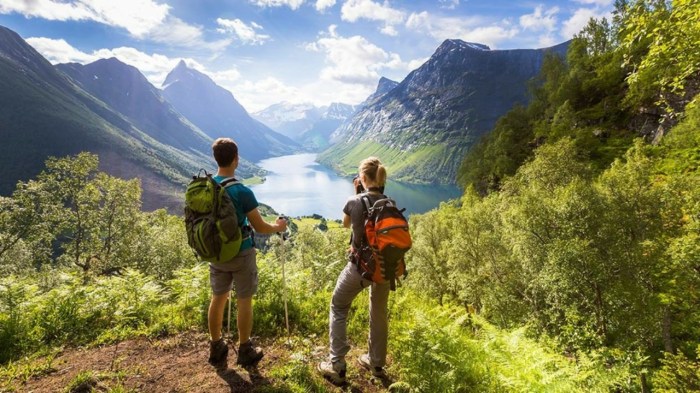
Eco-Friendly Travel Tips and Hacks take the spotlight, offering a wealth of innovative ideas to reduce your carbon footprint while exploring the world. Dive into a realm of sustainable travel practices that not only benefit the environment but also enhance your travel experience.
Discover how you can make a positive impact on the planet while embarking on unforgettable journeys.
Eco-Friendly Travel Tips and Hacks
Traveling in an eco-friendly way is essential to reduce our carbon footprint and protect the environment. By making conscious choices during our travels, we can minimize our impact on the planet and support sustainable practices.
Reduce Carbon Footprint
One of the most effective ways to reduce your carbon footprint while traveling is to pack light. Less luggage means less weight for transportation, resulting in lower fuel consumption and emissions. Choose eco-friendly modes of transportation whenever possible, such as walking, biking, or using public transit.
Sustainable Transportation Options
- Opt for trains or buses over planes for shorter distances to reduce emissions.
- Rent a bike or use bike-sharing services to explore the destination in an eco-friendly way.
- Consider carpooling or ridesharing to reduce the number of vehicles on the road.
Eco-Conscious Accommodation Choices
- Stay at eco-friendly hotels that prioritize sustainability and minimize waste.
- Choose accommodations that use renewable energy sources and implement water-saving practices.
- Support eco-lodges or homestays that promote community involvement and conservation efforts.
Support Local Communities and Businesses
- Shop at local markets and eat at locally-owned restaurants to support the economy and reduce carbon emissions from imported goods.
- Participate in community-based tourism activities to learn about local traditions and support cultural preservation.
- Engage with local artisans and purchase handmade souvenirs to contribute directly to the community.
Travel Guides

Travel guides play a crucial role in promoting responsible tourism by providing valuable information on eco-friendly practices, sustainable accommodations, and ethical experiences for travelers. They help raise awareness about the importance of preserving natural resources, supporting local communities, and minimizing the environmental impact of tourism.
Eco-Conscious Travel Guides
- Ecotourism.org: This website offers a comprehensive guide to eco-friendly travel destinations, responsible tour operators, and sustainable activities around the world.
- Lonely Planet’s “Best in Travel 2022”: This guide highlights eco-conscious destinations, accommodations, and experiences that prioritize sustainability and ethical tourism practices.
- National Geographic Traveler: Known for its commitment to environmental conservation, National Geographic Traveler features eco-friendly travel tips, green initiatives, and off-the-beaten-path destinations.
Highlighting Sustainable Destinations
Travel guides can showcase off-the-beaten-path sustainable destinations that are lesser-known but offer unique and enriching experiences for eco-conscious travelers. By featuring these hidden gems, guides can encourage tourists to explore new places, support local communities, and reduce overtourism in popular destinations. Additionally, highlighting sustainable destinations can promote responsible travel practices and inspire travelers to make more environmentally friendly choices during their trips.
Travel Blogs
Travel blogs play a crucial role in inspiring eco-friendly travel practices and promoting sustainable tourism. Many travel bloggers are advocating for environmental conservation and raising awareness about the importance of traveling responsibly.
Popular Travel Blogs Focusing on Sustainable Tourism, Eco-Friendly Travel Tips and Hacks
- Ecophiles: This blog covers a wide range of eco-friendly travel tips, from responsible wildlife tourism to sustainable accommodation options.
- Green Global Travel: Known for its in-depth articles on conservation efforts and sustainable travel destinations around the world.
- The Blonde Abroad: While not solely focused on eco-friendly travel, this blog often features tips on how to reduce your environmental impact while exploring the globe.
Impact of Travel Bloggers Advocating for Environmental Conservation
Travel bloggers have a significant influence on their audience and can shape travel behaviors towards more sustainable practices. By sharing personal experiences, tips, and recommendations, they can inspire others to make environmentally conscious choices while exploring new destinations. Their advocacy for environmental conservation can lead to a positive impact on local communities, wildlife, and natural landscapes.
Travel Planning Tools
When it comes to planning an eco-friendly trip, utilizing travel planning tools can make a significant difference in reducing waste and minimizing environmental impact. These digital resources can help travelers make more sustainable choices, from transportation and accommodation options to activities and dining.
Compare different eco-friendly travel planning apps
- Green Travel Choice: This app provides information on eco-friendly accommodations, transportation options, and activities at your destination. It also offers tips on reducing waste and supporting local communities.
- EcoBnb: EcoBnb allows users to book eco-friendly accommodations worldwide, helping travelers find sustainable places to stay that prioritize environmental conservation.
- Green Globe: Green Globe certifies hotels, resorts, and attractions that meet specific criteria for sustainability, making it easier for travelers to choose environmentally responsible options.
Discuss how travel planning tools can help reduce waste during trips
By using travel planning tools, travelers can access information on eco-friendly transportation modes, waste reduction tips, and sustainable accommodation options, leading to a decrease in overall waste generation during trips.
Share tips on using digital tools to minimize paper usage in travel planning
- Opt for e-tickets and digital boarding passes instead of printing out paper copies.
- Use electronic travel guides and maps on your smartphone or tablet rather than carrying physical copies.
- Utilize travel planning apps and websites to store itineraries, hotel reservations, and other important documents digitally.
Travel Tips and Hacks
When it comes to eco-friendly travel, there are several tips and hacks that can help you reduce your carbon footprint and minimize waste. From packing efficiently to reducing energy consumption, these practices can make a significant difference in your environmental impact while on the road.
Packing Tips for Eco-Friendly Travelers
- Opt for reusable and sustainable travel products such as bamboo utensils, stainless steel water bottles, and eco-friendly toiletries.
- Pack light to reduce fuel consumption during transportation and minimize the weight of your luggage.
- Choose multi-purpose clothing items to minimize the number of clothes you need to pack.
- Use packing cubes or reusable bags to organize your belongings and avoid using single-use plastic bags.
Ways to Minimize Plastic Waste While on the Road
- Carry a reusable water bottle and refill it at water stations to avoid buying single-use plastic bottles.
- Bring your own reusable shopping bags for groceries and souvenirs instead of using plastic bags.
- Avoid using plastic straws and utensils by carrying your own reusable alternatives.
- Choose accommodations and restaurants that prioritize sustainability and minimize plastic packaging.
Hacks for Reducing Energy Consumption in Accommodations
- Turn off lights, air conditioning, and electronics when not in use to conserve energy.
- Take shorter showers and avoid unnecessary water wastage during your stay.
- Open windows for natural ventilation instead of relying on air conditioning whenever possible.
- Choose accommodations that are certified green or eco-friendly to support sustainable practices.
Travel Gear and Packing: Eco-Friendly Travel Tips And Hacks
When it comes to eco-friendly travel, choosing the right gear and packing efficiently can make a significant impact on reducing your carbon footprint. Investing in sustainable travel gear not only benefits the environment but also ensures that your items last longer, reducing waste in the long run.
Recommend Sustainable Travel Gear Options
- Opt for luggage made from recycled or sustainable materials such as recycled plastics, organic cotton, or hemp.
- Choose reusable items like water bottles, utensils, and shopping bags to minimize single-use plastic waste.
- Look for eco-friendly toiletry bags made from biodegradable materials.
- Consider purchasing solar-powered chargers for your electronic devices to reduce energy consumption.
Discuss the Importance of Investing in Quality, Durable Travel Gear
Investing in high-quality travel gear may initially cost more, but it pays off in the long run by lasting longer and reducing the need for frequent replacements.
Quality, durable gear not only reduces waste but also ensures that your items can withstand the rigors of travel, making them more sustainable choices overall.
Share Tips on Packing Light to Reduce Carbon Emissions from Transportation
- Choose versatile clothing items that can be mixed and matched to reduce the number of clothes you need to pack.
- Avoid overpacking by planning your outfits ahead of time and packing only what you truly need.
- Consider using packing cubes or compression bags to maximize space in your luggage and minimize the weight of your belongings.
- Opt for travel-sized toiletries to reduce the weight of your luggage and avoid carrying excess liquids.
Travel Inspiration
Traveling to eco-friendly destinations not only allows you to explore the beauty of nature but also contributes to sustainable practices that help protect the environment. It’s a great way to immerse yourself in different cultures while making a positive impact on the planet.
Eco-Friendly Destinations
Visiting destinations that prioritize sustainability can inspire you to adopt more environmentally friendly habits in your daily life. Here are some eco-friendly destinations that promote sustainable practices:
- Costa Rica: Known for its commitment to conservation and eco-tourism, Costa Rica offers lush rainforests, diverse wildlife, and opportunities to support local eco-friendly initiatives.
- Norway: With its focus on renewable energy and sustainable living, Norway provides stunning natural landscapes, from fjords to glaciers, for travelers to explore responsibly.
- New Zealand: A leader in eco-tourism, New Zealand boasts pristine beaches, national parks, and Maori cultural experiences that emphasize respect for the environment.
Travelers Making a Positive Impact
Many travelers are making a positive impact on the environment through their actions and choices. By sharing their stories, we can learn from their experiences and be inspired to travel more mindfully:
- Volunteering with local conservation projects
- Supporting sustainable accommodations and tour operators
- Participating in beach clean-ups and community initiatives
Personal Growth and Environmental Awareness
Traveling mindfully can lead to personal growth and increased environmental awareness. By immersing yourself in different cultures and environments, you can gain a deeper appreciation for the planet and become a more conscious traveler:
- Learning about local conservation efforts and environmental challenges
- Adopting sustainable travel practices, such as reducing plastic waste and supporting eco-friendly businesses
- Reflecting on the impact of your travels and finding ways to minimize your carbon footprint
Solo Travel

When it comes to solo travel, responsible tourism plays a crucial role in ensuring that your adventures have a positive impact on the environment and local communities. Solo travelers have the unique opportunity to engage in meaningful cultural exchanges and raise awareness about environmental issues.
Tips for Solo Eco-Conscious Travelers
- Avoid single-use plastics by carrying a reusable water bottle and shopping bag.
- Support local businesses and artisans by purchasing souvenirs directly from them.
- Choose eco-friendly accommodations that prioritize sustainability practices.
- Offset your carbon footprint by opting for greener transportation options like trains or buses.
Benefits of Solo Travel for Cultural Exchange and Environmental Awareness
- Solo travelers have the freedom to immerse themselves in different cultures and traditions without the distractions of companions.
- By interacting with locals and participating in community activities, solo travelers can promote cross-cultural understanding and appreciation.
- Being on your own allows you to observe and appreciate nature more closely, fostering a deeper connection with the environment.
Safety Tips for Solo Travelers
- Research your destination thoroughly before your trip and familiarize yourself with local customs and laws.
- Stay connected with friends and family back home by sharing your itinerary and regular check-ins.
- Trust your instincts and avoid risky situations, especially when exploring unfamiliar areas.
- Carry important documents and emergency contacts in a secure place, and keep a copy with someone you trust.
Family Travel
When it comes to family travel, instilling eco-friendly values in children is crucial for raising environmentally conscious individuals. By incorporating sustainable practices into family trips, parents can teach kids the importance of caring for the planet and inspire them to be responsible global citizens.
Promoting Environmental Conservation Through Family-Friendly Activities
- Engage in beach clean-ups or nature hikes to teach children about the importance of preserving natural habitats.
- Visit local farms or farmers markets to support sustainable agriculture and educate kids about where their food comes from.
- Choose eco-friendly accommodations that prioritize sustainability and environmental conservation.
Tips for Reducing Waste and Energy Consumption While Traveling with Kids
- Bring reusable water bottles and snacks to minimize single-use plastic waste.
- Encourage kids to turn off lights, electronics, and air conditioning when not in use to conserve energy.
- Pack light and only bring essentials to reduce fuel consumption and carbon emissions during travel.
Couples Travel
Traveling as a couple can be a wonderful experience, allowing you to create lasting memories together. When it comes to eco-friendly travel, there are plenty of opportunities for couples to explore sustainable destinations and support local communities while on vacation.
Romantic Eco-Friendly Destinations
Embark on a romantic getaway to these eco-friendly destinations perfect for couples:
- Costa Rica: Explore lush rainforests, pristine beaches, and sustainable eco-lodges.
- Santorini, Greece: Enjoy breathtaking views, local cuisine, and eco-friendly accommodations.
- New Zealand: Discover stunning landscapes, eco-tours, and conservation initiatives.
Planning Sustainable Getaways
Here are some tips for couples to plan sustainable getaways together:
- Choose eco-friendly accommodations like eco-lodges, green hotels, or sustainable resorts.
- Offset your carbon footprint by supporting carbon offset programs or choosing eco-friendly transportation options.
- Participate in voluntourism activities to give back to local communities and support conservation efforts.
Supporting Local Communities
Ways for couples to support local communities while traveling:
- Shop at local markets and support small businesses to contribute to the local economy.
- Participate in cultural experiences and interact with locals to learn about their traditions and way of life.
- Respect the environment and local customs by practicing sustainable travel habits and being mindful of cultural differences.
Group Travel
Group travel can have a significant environmental impact due to the increased carbon footprint from multiple people traveling together. However, there are ways to minimize this impact and plan eco-friendly group trips.
Environmental Impact of Group Travel
When a group of people travels together, the carbon footprint can be larger compared to solo or couple travel. This is because multiple vehicles or flights may be required, leading to increased emissions. To minimize this impact:
- Avoid unnecessary flights by opting for alternative modes of transportation like trains or buses.
- Choose eco-friendly accommodations that prioritize sustainability and reduce energy consumption.
- Offset carbon emissions by supporting carbon offset projects or planting trees.
Tips for Planning Eco-Friendly Group Trips
Planning eco-friendly group trips involves making conscious choices that reduce environmental impact while still enjoying the travel experience. Consider the following tips:
- Plan activities that promote sustainability, such as hiking, biking, or volunteering for environmental projects.
- Choose destinations that are committed to eco-tourism and support local conservation efforts.
- Opt for reusable water bottles, utensils, and bags to minimize plastic waste during the trip.
Examples of Sustainable Group Travel Experiences
There are many group travel experiences that prioritize sustainability and offer unique opportunities to explore while minimizing environmental impact. Some examples include:
- Group camping trips in national parks with minimal environmental impact and leave-no-trace principles.
- Organized eco-tours that focus on wildlife conservation and support local communities.
- Volunteer group trips that involve environmental projects like beach clean-ups or tree planting initiatives.
Embark on your next adventure armed with the knowledge of eco-friendly travel tips and hacks, ensuring that your explorations leave a positive mark on the environment. Let these sustainable practices guide you towards a more responsible and fulfilling travel experience.
FAQ Insights
How can I support local communities while traveling?
You can support local communities by choosing locally-owned accommodations, dining at local restaurants, and purchasing souvenirs from local artisans.
What are some eco-friendly packing tips for travelers?
Opt for reusable travel containers, pack light to reduce fuel consumption, and choose multi-purpose clothing items to minimize luggage.
How can I reduce energy consumption in accommodations?
You can reduce energy consumption by turning off lights and electronics when not in use, taking shorter showers, and adjusting the thermostat to conserve energy.



